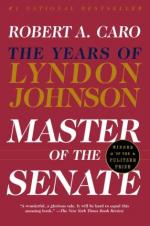|
This section contains 902 words (approx. 3 pages at 400 words per page) |

|
Civil Rights
Considerable coverage is given in Master of the Senate to the building crisis of civil rights abuse in the Deep South after World War II, including anecdotes about methods used to block registration and voting and means of reinforcing segregation and the degradation this created. The emergence of Martin Luther King, Jr. as an eloquent spokesman and organizer of peaceful protest; the showdown precipitated by the Supreme Court's condemnation of "separate but equal" accommodations; and the resurrection of the Ku Klux Klan and white backlash. It also portrays, primarily in the person and thought of Richard Russell, the southern philosophy of segregation as an institution benefiting both races.
Only isolated incidences of the massive race riots that would mark the years of LBJ's presidency are dealt with in this volume and are used to point to why southerners feared a change in their established ways. Most importantly...
|
This section contains 902 words (approx. 3 pages at 400 words per page) |

|




